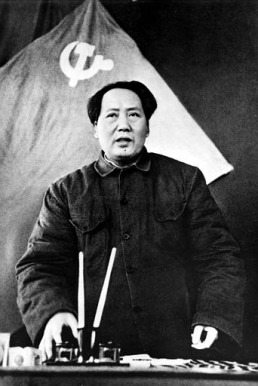Growing Up In Communism

Peng Yuan Zhen was born in 1938 in the Guangdong province of southeastern China. He was a young boy in a world of chaos. At a young age, he and his family were moved to the countryside from the city. Many Chinese regarded this eviction as bad, so Peng highly disliked it. At this time, China was in a weakened state. The Nationalists and the Communists were fighting for the governmental power, and the nation's economy was faltering greatly. The people of China were all searching for something they could believe in. The world was battling itself. Just as Peng was born, World War II broke out and pandemonium was everywhere. Because of its powerlessness, China attempted to stay out of it, only to find themselves in the biggest Asian war of the twentith century: the Second Sino-Japanese War. When Peng was growing up, all that surrounded Peng was the conflict of war. Everybody seemed to be fighting each other.
By the time Peng was eleven, Communism had defeated the Nationalists, and the People's Republic of China was created. This new system of government brought hope for better living to the peasants, who were a majority of the population. Mao Zedong, the leader of Communist China, had wiped out all the different social classes and combined them into one. The wealthy got poor and the poor got a fraction wealthier. For 85% of the Chinese population, the poor farmers, life seemed to be getting better. Since Peng's family had been poor and did not obtain much land for their farming, they were able to receive a tiny bit more after land had been taken away from landlords and the rich.
In the book Peony, the protagonist, Peony, goes through a similar transformation as Peng. She starts out as a bondmaid, but ultimately decides to become a nun. After spending ten years at a nunnery, Peony becomes the head and one of the wisest women in the city; now is she equal to her previous masters. Just like Peony, Peng's family begins as poor farmers in the lower class of society, but once Communism is developed, the social ranks are demolished and they considered equal to all the other civilians. But along with this improvement came some restrictions. Freedom of speech, expression, religion, press, and petition was completely forbiddened. If anyone had the audacity to go against Mao's teachings, they were to be imprisoned or even killed. Peng, and everybody else, now had to recite Mao's quotes before he ate, worked, began class, etc. Mao was like a god to them.
By 1958, Mao had devised a plan in order to improve China's economy so that by the late 1980s, it would be one of the wealthiest in the world. He planned to achieve this by improving industry and agriculture. Peng, twenty at the time, was forced into a commune like the rest of the country. A commune housed about 5000 families. There was no longer an individual anymore. Every possession one had now belonged to the entire commune, and it was its own family. During the beginning of the Great Leap Forward, there was plenty of food to eat and no one roamed hungry. However, soon the food supply began to decrease and people did not have enough to eat. This was the catalyst for the millions of Chinese dying of starvation. Peng was enclosed by starvation, and all he could dream about was the taste of food. Many people he knew were dying from famine, and all he could think to do was survive. The Great Leap Forward was great in no sense at all. If anything it should be renamed the Disastrous Jump Backwards, for all it did was take the lives of millions.
In 1966, another scheme from Mao came along called the Cultural Revolution in order to revive the spirit of the Chinese revolution. Fear arose in him that the restlessness brewing up could cause a new revolution against Communism. He decided to give the younger generations power over the older ones and made them Red Guards. The guards were supposed to abolish the Four Olds: Old Custom, Old Culture, Old Habit and Old Ideas. Propaganda was again everywhere in order to regain support and enforce fear. By this time, Peng had become less and less pleased with the government, but he dared not to speak out. He was frightened to go against this domineering government and stand up for what he believed in for he knew it could result in death. The Red Guard oversaw many activities done by the people, and if they did anything even slightly close to being considered offensive, they could be beaten severely. During this period, Peng had married and had three beautiful daughters. On Septemeber 9, 1976 Mao Zedong died. The entire country was in great mourning of their leader, even Peng. He had still been their leader, and all the propaganda issued about had protrayed him as saving the country. Although some did not agree with Mao, he pulled them out of their declining state and united the country once again.
The picture above is of Mao Zedong, the Chinese Communist leader. The flag behind him holds an image of a hammer and sickle, the communist symbol, that represents the working class and the agricultural workers and how they united together.http://apimages.ap.org/Search.aspx?kw=Mao+Zhedong&intv=None&sh=14&st=k&remem=x
